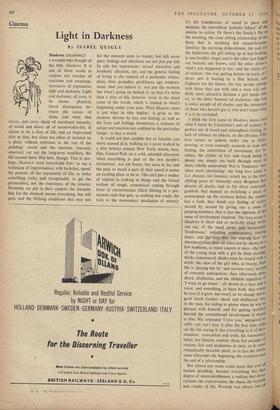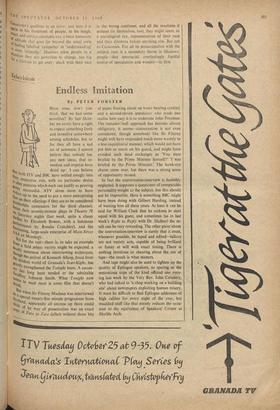Cinema
Light in Darkness
By ISABEL QUIGLY 1 WONDER who thought of the title, Shadows. It is one of those words to conjure any number of reactions and meanings, sfunzature of expression, light and darkness. Light and darkness, all sorts, is its theme: physical, literal discrepancy be- tween the colour of skins, and what that means, and every shade of emotional intensity, of mood and above all of mood-within-life. It claims to be a slice of life, and an improvised slice at that; but slices too often sit isolated on a plate; without reference to the rest of the pudding: mood and the moment, intensely observed, cut out the long-term modifiers, the life around them. Not here, though. That is, per- haps, Shadows' most remarkable feat: to use a technique of improvisation, with backchat, speed, the present, all the asymmetry of life, to make something rocky and recognisable, to get the permanence, not the transience, of the present. Moments are put in their context, the intensity that for the moment means everything, but will pass, and the lifelong conditions that may not for the moment seem to matter, but will never pass; feelings and affections are not just put side by side but interwoven: sexual attraction and brotherly affection, say, and the general feeling of living in the context of a particular colour, place, time, prejudice, prickliness, age, tempera- ment. And you believe it: not just the moment but what's going on behind it; so that it's more than a slice of life, however vivid, in the usual sense of the words, which is limited to what's happening under your nose. What Shadows does is just what its title implies: it gives us the shadows thrown by fact and feeling, as well as the facts and feelings themselves, a richness of action and reaction not confined to the particular image : in fact, a world.
A world not just credible but so familiar you move around in it, walking (as I never walked in a film before) around New York, streets, bars, flats, Central Park on a cold, splendid afternoon when everything is part of the two people's excitement: not yet lovers, but soon to be, and the park so much a part of their mood it seems an exciting place to be in. This isn't just a matter of realism in looking at things and the forced realism of rough, economical cutting through force of circumstances (illicit filming in a per manent rush that gets, as nothing else could, the rush or the momentary desolation of streets); the tin the use' for ting, gged salt sort as I and ange sud• him way ness what it's the transference of mood to place moment, the marvellous 'pathetic fallacy' of cinema in action. Or there's the family's flt the morning, the close sibling relationship of three that is anything but casual-beta familiar; the morning dishevelment, the rust the bathroom, the girl sitting up in bed loo to one brother, tragic and to the other just fal out because one knows, and the other doe what's just happened to her; and the whole of realism-the way getting beaten up hurts. never saw it 'hurting in a film before, frightens for the future, the way people chl with those they are with and a man will denly seem attractive because a girl thinks so; or the bitter humour of exclusion—the it unites people of all shades, and the obtuse of those who haven't got it, who don't know ' it is to be excluded.
1 think the love scene in Shadows shows what I mean by Cassavetes's sort of rcalisn perfect use of mood and atmospheric feelini lack of reliance on objects, on the obvious. love scenes so seldom strike one as li moving, or even remotely accurate in tone feeling, the convention of movement, fol stance, the clichds of kiss and touch bein phony one simply sits back through nos them, wholly uninvolved. Nor is 'frankness' often more convincing: the long love see Les Ainants, for instance, struck me as the chilling piece of virtuosity since Bergman dreamt of clocks, and as for those semi- gambols that depend on twitching a piec counterpane up the moment before the cal has a look, they break any feeling of rc second by second by giving one a sens peeping-tommery that is just the opposite o sense of involvement required. The love sce Shadows is short and so perfectly exact out any of the usual props and moverr 'franknesses,' twitching counterpanes, ro music, and the rest) that one marvels ho" elsewhere) even here all sides can be shown few moments, so many aspects at once—the of the young man with a girl he finds exc thinks experienced, thinks must be wooed " drink; the view of the girl who, at twenty, life is 'passing her by' and savours every se of romantic anticipation; then afterwards shock, disillusion, and the childish repetitic 'I want to go home': all shown in a face voice; and something, in them both, that be love if it grew, but won't, as we already k grow much further; shock and disillusion, in the man, for failing to please when he v41 pleased with himself, and for getting illy( beyond the conventional involvement it n to him. His reiterated 'I love you,' whisper( softly you can't hear it after the first time, see his lips saying it, has everything in it of situation: convention and truth, his moire belief, her illusion, realism, those few minut tension, fear and tenderness at once, at its romantically bearable pitch; as in fact the v scene telescopes the beginning, the evolution the end of a relationship. But almost any scene could stand that sc human prodding, because everything has degree of unmistakableness, a realism that excludes the explosiveness, the chaos, the wa and cruelty of life. Warmth was always 01 best 1, its
g, its
Film kelY, and g so t of very lc in most first nude c of !ilea alitY e of I the nc in with- ents, wring v (as in a view ith 3 feels COnd pain, m of and a 'out(' now,
too,
as S° olVed
leant
SO
only their ntarY es of most whole land
rrt of that lever rolth le of Cassavetes's qualities as an actor; and here it is again in his treatment of people, in his tough, exact, and always cinematic eye, a basic humanity et attitude that goes far beyond the usual sorts cif feeling labelled 'sympathy' or `understanding' or even 'empathy.' Shadows takes people in a Illation they arc powerless to change, too big Or a lifetime to get over: stuck with their race in the wrong continent, and all the reactions it arouses (in themselves, too), they might seem, to a sociological eye, representatives of their race and their dilemma before anything else. But not to Cassavetes. For all its preoccupation with the subject, race is a secondary theme in Shadows; people---that interracial, everlastingly fruitful source of speculation and wonder—its first.



















































 Previous page
Previous page